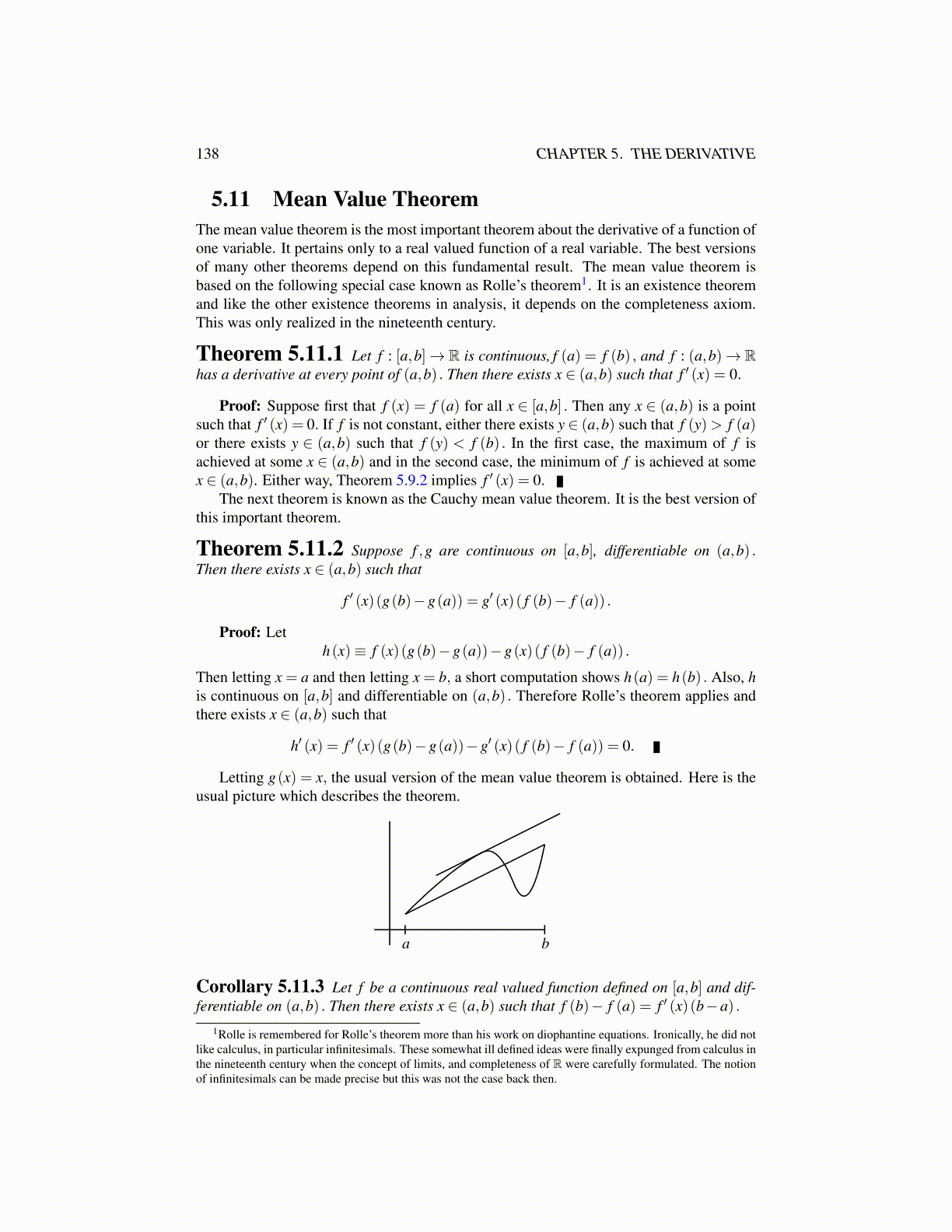
138 CHAPTER 5. THE DERIVATIVE
5.11 Mean Value TheoremThe mean value theorem is the most important theorem about the derivative of a function ofone variable. It pertains only to a real valued function of a real variable. The best versionsof many other theorems depend on this fundamental result. The mean value theorem isbased on the following special case known as Rolle’s theorem1. It is an existence theoremand like the other existence theorems in analysis, it depends on the completeness axiom.This was only realized in the nineteenth century.
Theorem 5.11.1 Let f : [a,b]→ R is continuous, f (a) = f (b) , and f : (a,b)→ Rhas a derivative at every point of (a,b) . Then there exists x ∈ (a,b) such that f ′ (x) = 0.
Proof: Suppose first that f (x) = f (a) for all x ∈ [a,b] . Then any x ∈ (a,b) is a pointsuch that f ′ (x) = 0. If f is not constant, either there exists y ∈ (a,b) such that f (y)> f (a)or there exists y ∈ (a,b) such that f (y) < f (b) . In the first case, the maximum of f isachieved at some x ∈ (a,b) and in the second case, the minimum of f is achieved at somex ∈ (a,b). Either way, Theorem 5.9.2 implies f ′ (x) = 0.
The next theorem is known as the Cauchy mean value theorem. It is the best version ofthis important theorem.
Theorem 5.11.2 Suppose f ,g are continuous on [a,b], differentiable on (a,b) .Then there exists x ∈ (a,b) such that
f ′ (x)(g(b)−g(a)) = g′ (x)( f (b)− f (a)) .
Proof: Leth(x)≡ f (x)(g(b)−g(a))−g(x)( f (b)− f (a)) .
Then letting x = a and then letting x = b, a short computation shows h(a) = h(b) . Also, his continuous on [a,b] and differentiable on (a,b) . Therefore Rolle’s theorem applies andthere exists x ∈ (a,b) such that
h′ (x) = f ′ (x)(g(b)−g(a))−g′ (x)( f (b)− f (a)) = 0.
Letting g(x) = x, the usual version of the mean value theorem is obtained. Here is theusual picture which describes the theorem.
a b
Corollary 5.11.3 Let f be a continuous real valued function defined on [a,b] and dif-ferentiable on (a,b) . Then there exists x ∈ (a,b) such that f (b)− f (a) = f ′ (x)(b−a) .
1Rolle is remembered for Rolle’s theorem more than his work on diophantine equations. Ironically, he did notlike calculus, in particular infinitesimals. These somewhat ill defined ideas were finally expunged from calculus inthe nineteenth century when the concept of limits, and completeness of R were carefully formulated. The notionof infinitesimals can be made precise but this was not the case back then.